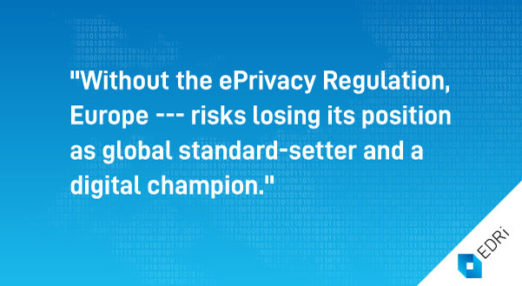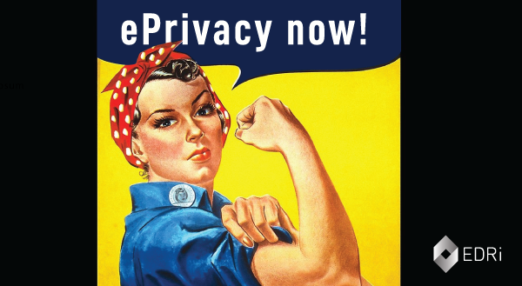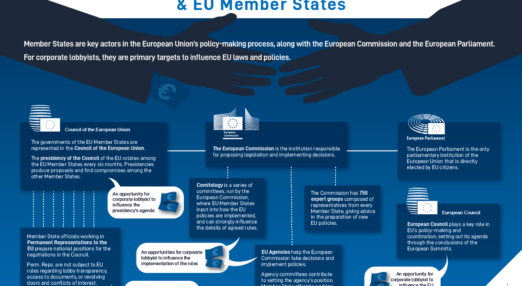ePrivacy Regulation
Filter resources
-

#PrivacyCamp20: Technology and Activism
The 8th annual Privacy Camp will take place in Brussels on 21 January 2020. With the focus on “Technology and Activism”, Privacy Camp 2020 will explore the significant role digital technology plays in activism, enabling people to bypass traditional power structures and fostering new forms of civil disobedience, but also enhancing the surveillance power of […]
Read more
-

Open letter to EU Member States: Deliver ePrivacy now!
On 11 October 2019, EDRi, together with four other civil society organisations, sent an open letter to EU Member States, to urge to conclude the negotiations on the ePrivacy Regulation. The letter highlights the urgent need for a strong ePrivacy Regulation in order to tackle the problems created by the commercial surveillance business models, and […]
Read more
-

Why weak encryption is everybody’s problem
Representatives of the UK Home Department, US Attorney General, US Homeland Security and Australian Home Affairs have joined forces to issue an open letter to Mark Zuckerberg. In their letter of 4 October, they urge Facebook to halt plans for end-to-end (aka strong) encryption across Facebook’s messaging platforms, unless such plans include “a means for […]
Read more
-

Right a wrong: ePrivacy now!
When the European Commission proposed to replace the outdated and improperly enforced 2002 ePrivacy Directive with a new ePrivacy Regulation in January 2017, it marked a cautiously hopeful moment for digital rights advocates across Europe. With the backdrop of the General Data Protection Regulation (GDPR), adopted in May 2018, Europe took a giant leap ahead […]
Read more
-

CJEU on cookies: ‘Consent or be tracked’ is not an option
European Digital Rights (EDRi) welcomes the CJEU's confirmation that under the current data protection framework, cookies can only be set if users have given consent that is valid under the General Data Protection Regulation (GDPR).
Read more
-

Your mail, their ads. Your rights?
In the digital space, “postal services” often snoop into your online conversations in order to market services or products according to what they find out from your chats. A law meant to limit this exploitative practice is stalled by the Council of European Union
Read more
-

Your family is none of their business
Today’s children have the most complex digital footprint in human history, with their data being collected by private companies and governments alike.
Read more
-

Von der Leyen: An ambitious agenda for digital rights
On 16 July 2019, the European Parliament elected Ursula von der Leyen as President of the European Commission with 383 votes, which is only nine votes above the minimum needed. Parts of the Socialists, Liberals, and Greens initially had doubts regarding the candidate. However, her speech in the Plenary before the vote and the agenda […]
Read more
-

German Big Brother Awards – one “winner” reacts and appears
The German Big Brother Awards (BBA) gala was held on 8 June 2019 in Bielefeld, Germany. Organised annually since 2000 by EDRi member Digitalcourage, this year’s gala was the third to be streamed live in English in addition to the original German. For the second time, the venue was Bielefeld theatre, where the stage set […]
Read more
-

Captured states – e-Privacy Regulation victim of a “lobby onslaught”
Compared to non-governmental organisations and trade unions, private corporations are far better equipped to influence European level decision-making. A report “Captured states: when EU governments are a channel for corporate interests” by Corporate Europe Observatory’s (CEO) describes the various ways corporations approach the Member States of the European Union to maximise their impact.
Read more
-

ePrivacy: Private data retention through the back door
Blanket data retention has been prohibited in several court decisions by the European Court of Justice (ECJ) and the German Federal Constitutional Court (BVerfG). In spite of this, some of the EU Member States want to reintroduce it for the use by law enforcement authorities – through a back door in the ePrivacy Regulation.
Read more
-

Passenger surveillance brought before courts in Germany and Austria
EDRi members Gesellschaft für Freiheitsrechte (GFF, Society for Civil Rights) and Epicenter.works have taken legal action against the mass retention and processing of Passenger Name Records (PNR) before German and Austrian courts and authorities. The European PNR Directive (Directive 2016/681) requires airlines to automatically transfer their passengers’ data to state authorities. There, the data are […]
Read more
